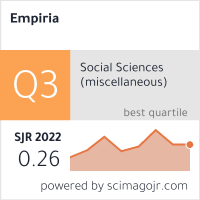A darwinian theory of gene-culture coevolution
DOI:
https://doi.org/10.5944/empiria.23.2012.769Keywords:
Boyd&Richerson, gene-culture coevolution, Darwinism, social sciences, Donald T CampbellAbstract
Darwin believed that his theory of evolution would stand or fall on its ability to account for human behavior. The ideas in the Descent of Man were widely discussed by his contemporaries although they were far from the only evolutionary theories current in the late 19th Century. Darwin’s specific evolutionary ideas and those of his main followers had very little impact on the social sciences as they emerged as separate disciplines in the early 20th Century. The social and biological sciences continued to diverge until the late part of the twentieth century. In the 1960s, Donald T. Campbell, an American social psychologist, published some of the first theoretical work that adapted principles of evolutionary theory to the problem of the evolution of cultures. Since the pioneering work of Campbell several research programmes on evolutionary approaches to human culture have been developed. Here we sketch our own theory of gene-culture coevolution. Despite his prestige, Darwin convinced only a few of his contemporaries that he had the correct theory of the origin of the human mind. His strongest influence was on the pioneering psychologists, Romanes, Morgan, James, and Baldwin, but their importance in psychology waned drastically after the turn of the 20th Century (Richards, 1987). No 20th Century social science derives any significant influence from the Descent of Man, and to this day, eminent social scientists are quite hostile to Darwinism. How can it be that a theory can generate so much controversy, and yet not attract enough critical work to test its worth for over a century? Can we flesh out a satisfactory theory of the evolution of human behavior along Darwinian lines, or is the enterprise really fatally flawed?
Downloads
Downloads
How to Cite
Issue
Section
License
Los autores que publican en esta revista están de acuerdo con los siguientes términos:a) Los autores conservan los derechos de autor y garantizan a la revista el derecho de ser la primera publicación del trabajo al igual que licenciado bajo una Licencia Internacional Creative Commons CC BY-NC-SA 4.0.
b) Se permite y se anima a los autores a difundir electrónicamente las versiones pre-print (versión antes de ser evaluada) y/o post-print (versión evaluada y aceptada para su publicación) de sus obras antes de su publicación, ya que favorece su circulación y difusión más temprana y con ello un posible aumento en su citación y alcance entre la comunidad académica.












